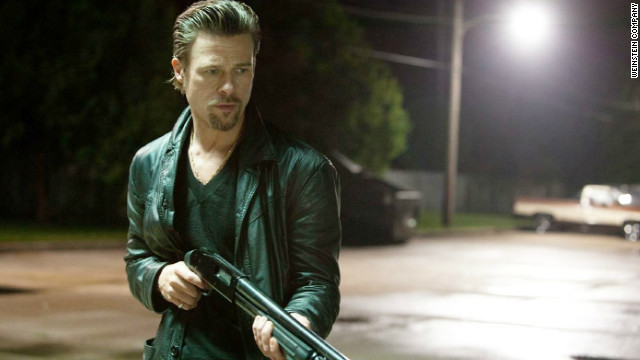
- The film is based on George V. Higgin's 1974 crime novel "Cogan's Trade"
- Brad Pitt is a killer with a contract to fulfill
- The supporting cast includes Ray Liotta and James Gandolfini
Editor's note: This review may include spoilers.
(CNN) -- The head of the nail -- Andrew Dominik's new movie hits it hard and square.
Maybe too hard for those who appreciate a little ambiguity with their messaging, but ambiguity is not on the agenda in this tale of business ethics at the dark end of the street. Adapting and updating George V. Higgin's 1974 crime novel "Cogan's Trade" and resuming his collaboration with "The Assassination of Jesse James by the Coward Robert Ford" producer/star Brad Pitt, Dominik has crafted a poison pen letter to late capitalism in general and the United States in particular.
That sounds like a long reach for a thriller, but gangster films as different as "The Godfather" and "Scarface" have cast a baleful eye on the American pursuit of happiness before. But even then, "The Dream" never seemed so rotten to its core as in this caustic, corrosive piece of pulp nihilism.
This is New Orleans, so wet it's as if the floods never left. October 2008. Wall Street and the dam have burst. The airwaves are clogged with economic meltdown. President George W. Bush is trying to sell the bailout. Barack Obama is trying to sell himself and a vision of community that's wildly at odds with the dog-eat-dog world we see on screen. (The two presidents feature so strongly in the elaborate sound design they're practically supporting characters.)
Brad Pitt is Cogan, one of those guys you go to with a job you don't want to spell out. For $10,000, he'll resolve the problem. Who are his employers?
It's never specifically stated, but his contact, played with squirmy embarrassment by Richard Jenkins, complains about the committee mentality, the squeamishness and the lack of leadership, so we know it's the corporate mafia.
Gambling has been shut down in the city after a couple of lowlifes hit a big-money poker game knowing that the host, Markie (Ray Liotta), will pay the price (he's foolishly admitted to jacking his own game once before). Cogan knows that Markie wasn't involved this time -- no one is that dumb -- but recognizes that it makes no difference, he'll have to pay before things can settle back to business as usual.
Meanwhile the real thieves -- pathetic scuzzballs looking to stake their own claim on the Dream (Ben Mendelsohn and Scoot McNairy) -- soon spill their secret, and Cogan calls in a colleague from out of state to dispatch the guy who put them up to it.
He doesn't want to do this one himself, he knows the guy. "Have you ever killed someone? It gets touchy-feely. They cry. They plead. They piss themselves. They cry for their mothers. It gets embarrassing. I like to kill them softly. From a distance."
The plotting is as remorseless as Cogan's logic, but the movie has an unusual and distinctive structure, one that comes straight from Higgins, the Boston lawyer best known for "The Friends of Eddie Coyle" (filmed with Robert Mitchum the year before "Cogan's Trade" was published). Higgins let his stories seep out from eavesdropped conversations, almost between the lines, putting the reader in the position of a juror trying to untangle a case from dozens of competing testimonies.
In "Killing Them Softly," action scenes are doled out almost as counterpoint, tense but self-contained exclamations of aestheticized blood-letting.
The movie's real meat -- its heart and soul, if it has any -- lies in its coursing torrent of words; a filthy tirade of crude, funny, deeply cynical man talk (there's one female speaking part in the movie, and she's a hooker). The men speak at each other. They're all incontinent storytellers, bragging, justifying, hustling, cajoling, complaining, but only dimly comprehending.
There's an echo of Quentin Tarantino here -- and Elmore Leonard before him -- but there are no pop culture references in Higgins. The speechifying isn't flip, cool or ironic, even if it does encourage displays of actorly machismo (closer to Martin Scorsese, in fact).
In the movie's superb, sour centerpiece, there are two lengthy conversations -- monologues, almost -- featuring James Gandolfini as a bloated, alcoholic, bitter and defeated killer. He's an aging hit man gone to seed facing a third long spell in jail and no one there at home when he comes out again. Gandolfini is brutal in this role, all his tenderness turned vicious and repulsive through self-pity. But still, at least we discern the ashes of emotion in this wreck of a man.
Discreetly, not unkindly, Cogan arranges for his removal and takes over the contract. Cogan is the consummate professional, the hero by default in a movie without heroics, a savagely cynical satire on a bankrupt system in terminal decline.